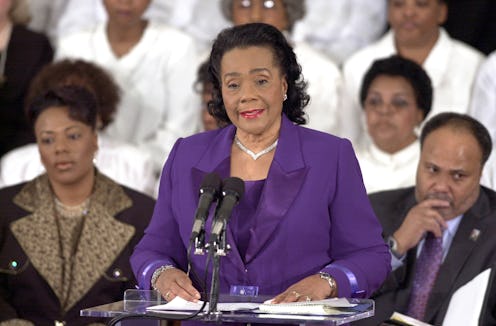News
How We Can Further Coretta Scott King's Fight

On Tuesday night during a hearing for the confirmation of Jeff Sessions for Attorney General, Republicans stopped Massachusetts Sen. Elizabeth Warren from reading the words of civil rights activist Coretta Scott King. They did so under the claim it was an insult to Sessions. The silencing set off a firestorm of outrage and, thanks to Senate Majority Leader Mitch McConnell's justification for it, a new rallying cry: "Nevertheless, she persisted." But let's not lose sight of the woman behind the powerful critique of Sessions and consider ways we can further Coretta Scott King's fight today?
The message that Warren was prevented from reading in Senate was King's 1986 letter about Sessions, which urged the Senate to reject him as a federal judge. King expressed serious concerns about Sessions' professional history and his ability to protect the rights of African Americans:
Anyone who has used the power of his office as United States Attorney to intimidate and chill the free exercise of the ballot by citizens should not be elevated to our courts. Mr. Sessions has used the awesome powers of his office in a shabby attempt to intimidate and frighten elderly black voters. For this reprehensible conduct, he should not be rewarded with a federal judgeship.
There's a lot to unpack here, especially considering the fact that in 1986 Sessions was rejected as a federal judge over accusations of exhibiting racism in his professional life but now, in 2017, Sessions has been confirmed as attorney general. While many Americans are angered by Sessions' confirmation, a great way to take a proactive approach is to examine King's words in her letter and use them as a galvanizing force. So, here are a few ways we continue King's fight in 2017.
1. Donate To Black Lives Matter
If you have the means, donating to Black Lives Matter is a palpable way to put your money where your mouth is and lend support to the black liberation movement. Donations go towards everything from organizing costs, to bail funds for protesters, to grants for young artists and students.
2. Attend A Black Lives Matter Protest Or Event
If you're not sure where to start, you can find your local Black Lives Matter chapter through the website. There's a calendar full of sit-ins, protests, educational events you can support and lend your physical body to. For example, on Friday an assemblage of Black Lives Matter organizers blocked Betsy DeVos from entering a school in Washington D.C. in protest of her policies valuing the privatization of public schools.
3. Learn Your State's Voting Identification Laws And Rights
King's letter largely addressed concerns over accusations that Sessions tried to restrict black voters in the South (an accusation he has denied), and how that made unfit to be a federal judge. Sadly, voter suppression is a problem in the United States, but in order to effectively fight repressive legislation, we have to know the forms in which it exists. If you haven't already, spend some time researching the voter identification laws in your state and see how it compares to others. From there, all your work will be more effective.
4. Attend A Community Board Meeting
Every state, city and town has a community board (or multiple) that deals with issues of permits and licenses, and brainstorms legislative ideas to push on city council. All community board meetings are open to the public, in fact, public engagement is encouraged. In order to enact change, whether it be advocating for accessible voting rights, or reforming community policing tactics, the community board is for and of the people. You can find your community board here.
5. Join The League Of Women Voters
You can get involved in the League of Women Voters by volunteering, donating, or even sharing articles and resources. One of the main issues the league advocates for is voter's rights and fighting voter repression, so supporting the group is a great way to advance King's legacy and turn her words into action.
6. Donate To The ACLU
The ACLU has remained on the front lines of fighting to win and maintain civil liberties for all Americans. More specifically, the ACLU has been fighting voter suppression for decades, so all donations towards the ACLU are directly benefiting King's fight.
7. Run For Local Office
The non-profit Run For Something was just launched in the wake of Donald Trump's election as a recruitment resource for young people (and people of all ages) looking to change policy from the grassroots level. If you're feeling passionate about advocacy, even if you're not sure about the time and money, this is a great resource for researching your options!